Final
Deadline
April 16, 2026
Judging
Date
May 18, 2026
Winners
Announced
June 10, 2026

In a recent interview, Michael Hoefling, Regional and Category Ambassador for the Sommeliers Choice Awards shared his perspective on why sustainability has become so essential in the wine industry. With a deep-rooted background in agriculture and wine, Hoefling has established himself as an influential voice for eco-conscious practices in the Bay Area. His work with the Sommeliers Choice Awards positions him as a leader in promoting sustainable wine brands, educating both consumers and producers on the positive impact of environmental responsibility.
Here’s what he had to say about the growing demand for sustainable wines and the role that awards like the SCA play in this movement.
When asked about what sparked his passion for sustainability, Hoefling traced his journey back to the heart of California wine country. “My inspiration really came from the wineries in my own backyard—Napa Valley, Sonoma County, and California as a whole,” he said. “So many of these businesses preach the ethos of responsible farming, and seeing them make positive changes made me want to do the same.” Watching local vineyards take a proactive approach to protecting the environment ignited his dedication to sustainability, an ethos he now champions through his role with the Sommeliers Choice Awards.
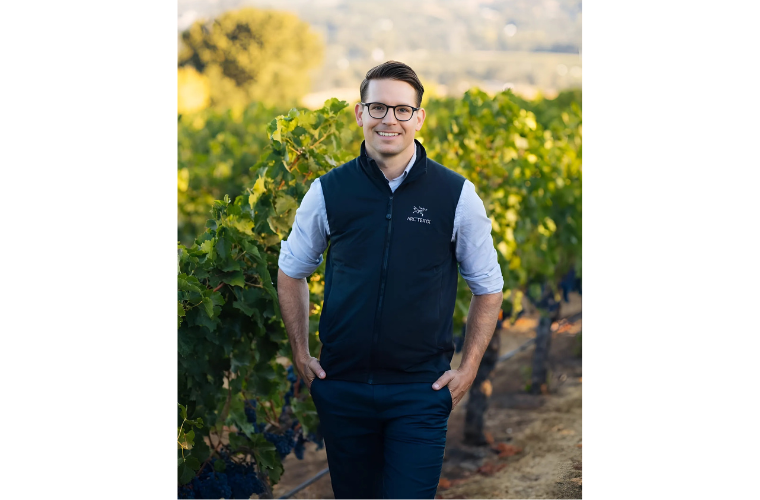
The Sommeliers Choice Awards (SCA) are not your typical wine competition. While the primary focus is on taste, SCA has become a platform for celebrating wines that also embody environmental responsibility. Hoefling explained that, as Sustainability Ambassador, he’s proud to help bring awareness to sustainable wines. “SCA isn’t about following trends—it’s about connecting wineries and beverage businesses with buyers who are looking for more than just a label,” he said.
While taste remains the first criterion for selection, sustainable practices add an extra layer of appeal. “When sommeliers and buyers learn that a wine is not only delicious but also produced with care for the environment, it can make a big difference,” Hoefling shared. He emphasized that, for small wineries especially, this recognition can provide a valuable marketing boost, helping them gain attention in a crowded market.
Hoefling is firm in his belief that sustainability is more than a trend; it’s essential for the industry’s future. “Honestly, it’s just the right thing to do,” he noted. For him, the real value in sustainable wine production lies in creating a wine with purpose, a wine that reflects its place and the care of those who produce it.
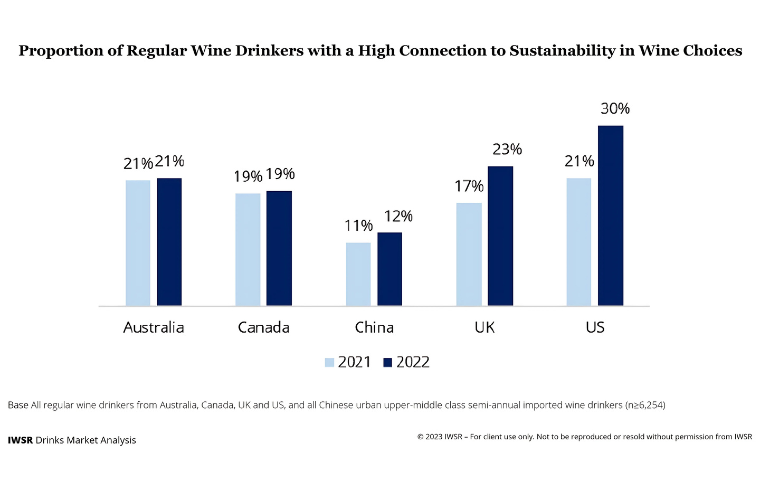
Source: The IWSR
He believes that, in a time when consumers—especially Millennials and Gen Z—are prioritizing eco-conscious purchases, sustainable practices give brands a crucial edge. “I haven’t seen any instance where going sustainable has hurt a winery’s public image. If anything, it makes people appreciate the wine more,” Hoefling remarked. Embracing sustainability allows wine brands to appeal to a broader audience while staying true to an ethical approach that enhances both brand image and product integrity.
According to Hoefling, a commitment to sustainability can transform a winery’s reputation in significant ways. He outlined several key benefits for brands that choose this path:
1) Consumer Appeal: “Younger buyers are really tuned into sustainability,” he noted, explaining that eco-friendly practices often attract a more engaged and loyal customer base.
2) Positive Brand Perception: “When you’re a winery that openly values the environment, it builds trust,” Hoefling said. Consumers associate these brands with responsible values, which translates to a positive image.
3) Trust and Loyalty: Hoefling highlighted that transparency in sustainability can lead to customer loyalty and repeat business. “People want to feel good about what they buy,” he explained.
4) Competitive Advantage: Sustainability offers a unique selling point, distinguishing brands in a competitive market.
5) Social Responsibility: Consumers often view sustainable wineries as socially responsible businesses, an association that elevates brand perception.
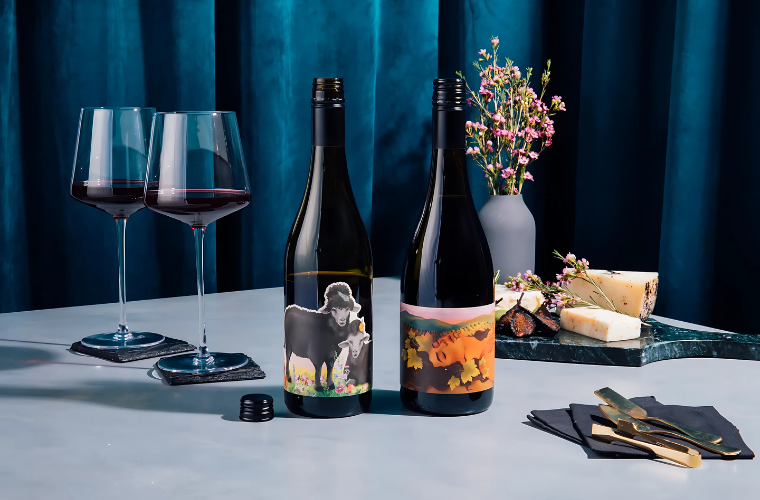
The McBride Sisters Wine Company has just released “Papatūānuku” – which translates to “Mother Earth” in the native Māori language
In his interview, Hoefling shared insights into why wines from sustainable brands appeal not only to consumers but also to buyers and sommeliers. “Most wine growers who are really involved in their craft want to do the right thing for the environment,” he said. Certification programs like California Certified Sustainable help communicate these efforts, signaling to buyers that they’re supporting a responsible product.
Hoefling pointed out that sommeliers play a unique role in educating guests about sustainability, serving as ambassadors for the wineries. “Sommeliers care deeply about the stories behind the wines they present,” he said. “When they can say a wine was produced sustainably, it adds a whole new layer to the guest’s experience.” He also noted a particular sommelier “pet peeve”—overly packaged wines. “No one wants unnecessary waste. It all just ends up in the trash anyway,” he added, calling for more thoughtful packaging practices among wine producers.
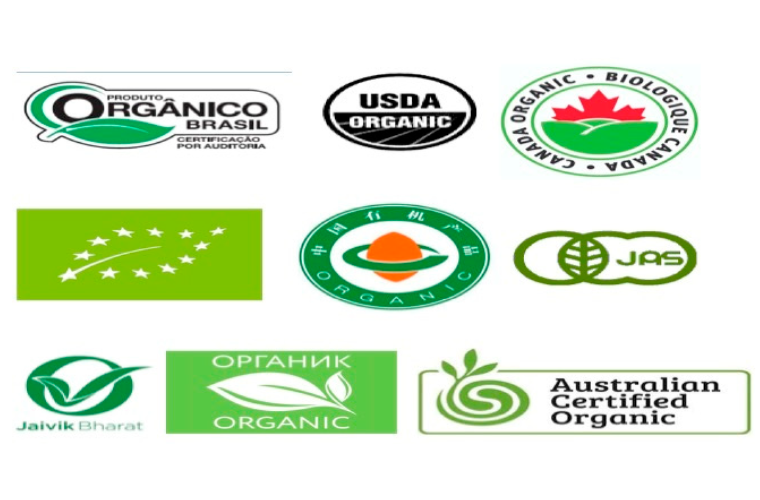
Organic logos/seals in force in (from left to right and from top to bottom) Brazil, USA, Canada, European Union, China, Japan, India, Russia, Australia.
To help wineries reduce their environmental impact, Hoefling recommended several practices that can be seamlessly integrated into production:
1) Organic and Biodynamic Farming: Reduces the need for pesticides and supports soil health.
2) Water Conservation: “With California’s water issues, efficient irrigation is key,” he noted.
3) Renewable Energy: Incorporating solar or other renewables to cut carbon emissions.
4) Waste Reduction: Minimizing production waste and recycling where possible.
5) Preserving Biodiversity: Maintaining natural habitats around vineyards to support local ecosystems.
These practices help wineries create a “wine of place,” where the land and the environment play a central role in crafting a product that truly reflects its origins.
Through the Sommeliers Choice Awards, Hoefling sees an opportunity to support brands that prioritize sustainable values. “SCA is about more than just flavor; it’s about highlighting wines that have a positive impact on the environment,” he explained. By giving sustainable wines a platform, SCA encourages other wineries to adopt eco-friendly practices, contributing to a more responsible industry.

For small producers, this recognition can be especially impactful. “Awards like SCA bring attention to wineries that might otherwise go unnoticed, particularly for their sustainable efforts,” Hoefling said. “It helps them connect with buyers who appreciate those values, and that’s incredibly important in a competitive market.”
Asked about the core message he hopes to share, Hoefling emphasized that sustainability should be a way of life in wine production. “It’s not just about making a delicious wine; it’s about respecting the land and the people who enjoy it,” he said. For him, sustainable wine production is part of a holistic approach that extends to every aspect of winemaking, from the vineyard to the bottle.
He encourages consumers to ask questions about the wines they choose, urging them to look beyond flavor to consider the values behind each bottle. “Wine is something we put into our bodies, so we should care about how it’s made. A wine that’s crafted with environmental care and intention has real value—it respects both the land and the legacy of those who make it,” he shared.
[[relatedPurchasesItems-61]]
As sustainability continues to evolve in the wine industry, Hoefling sees regenerative agriculture as a promising area of growth. “Regenerative practices restore soil health, increase biodiversity, and improve water cycles. It’s a method that truly works with nature,” he explained. Hoefling believes that with greater awareness, more consumers will begin asking wineries about their farming and production methods, driving the industry further toward responsible practices.
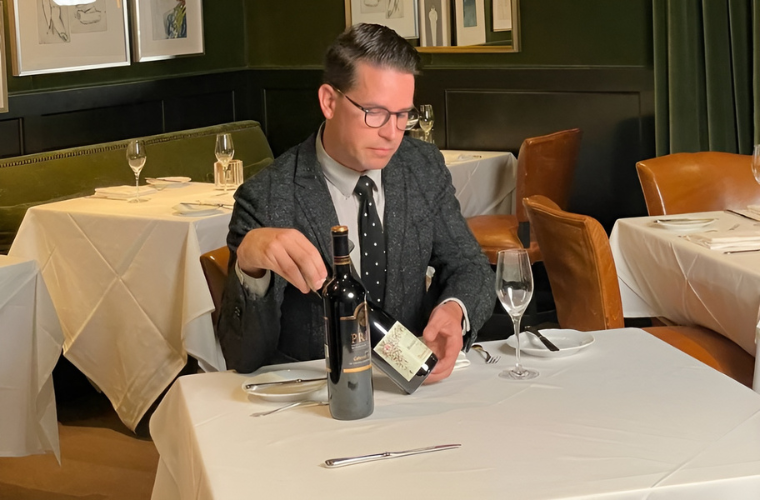
Michael Hoefling recently did a video episode on the Inside the Drinks business podcast and for the Sommeliers Choice Awards on Sustainable brands and how to sell them. Check the Inside the Drinks Business podcast channel to see the video.
In his role with the Sommeliers Choice Awards, Michael Hoefling advocates for a wine industry that values both quality and environmental responsibility. As consumer interest in sustainable products grows, wineries that adopt eco-friendly practices are likely to build stronger connections with their audience, boost their brand reputation, and foster long-term loyalty. Through his work with the SCA, Hoefling continues to inspire the wine world to see sustainability not just as a practice but as an integral part of a wine’s story—one that honors both the earth and the people who enjoy its fruits.
Header image: Left to Right; Ankita Okate, Chief Growth Officer at Beverage Trade Network with Michael Hoefling, Regional and Category Ambassador for Sommeliers Choice Awards
Also Read:
Marsha Wright's Guide to Curating the Perfect Wine List
Christopher Fagan’s Guide To Curating The Perfect Guest Experience And Beverage Program
Multipotentialite Jesse Becker MS Discusses Wine, Business and Hospitality
Enter your Wines now and get in front of top Sommeliers, Wine Directors, and On-Premise Wine Buyers of USA.
